许老师初级英语阅读教案55
- 格式:doc
- 大小:326.00 KB
- 文档页数:54
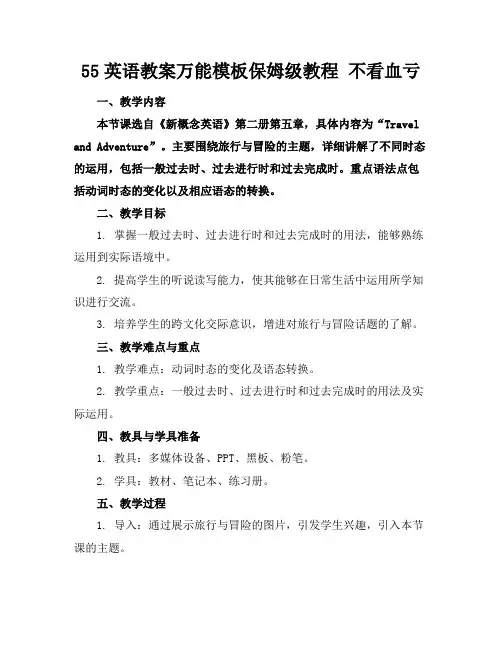
55英语教案万能模板保姆级教程不看血亏一、教学内容本节课选自《新概念英语》第二册第五章,具体内容为“Travel and Adventure”。
主要围绕旅行与冒险的主题,详细讲解了不同时态的运用,包括一般过去时、过去进行时和过去完成时。
重点语法点包括动词时态的变化以及相应语态的转换。
二、教学目标1. 掌握一般过去时、过去进行时和过去完成时的用法,能够熟练运用到实际语境中。
2. 提高学生的听说读写能力,使其能够在日常生活中运用所学知识进行交流。
3. 培养学生的跨文化交际意识,增进对旅行与冒险话题的了解。
三、教学难点与重点1. 教学难点:动词时态的变化及语态转换。
2. 教学重点:一般过去时、过去进行时和过去完成时的用法及实际运用。
四、教具与学具准备1. 教具:多媒体设备、PPT、黑板、粉笔。
2. 学具:教材、笔记本、练习册。
五、教学过程1. 导入:通过展示旅行与冒险的图片,引发学生兴趣,引入本节课的主题。
2. 新课内容展示:讲解一般过去时、过去进行时和过去完成时的用法,结合教材例句进行分析。
3. 例题讲解:针对每个时态,给出典型例题,进行详细讲解,让学生掌握解题思路。
4. 随堂练习:发放练习册,让学生进行随堂练习,巩固所学知识。
5. 小组讨论:将学生分成小组,讨论旅行中的趣事,运用所学时态进行表达。
6. 学生展示:邀请部分学生上台展示,检验学习效果。
六、板书设计1. Travel and Adventure2. 主要内容:a. 一般过去时b. 过去进行时c. 过去完成时d. 各时态的用法及例句七、作业设计1. 作业题目:a. 根据所学时态,编写一段旅行经历。
b. 翻译下列句子:他昨天在机场等了我一个小时。
c. 选择题:判断下列句子中哪个时态使用错误,并改正。
2. 答案:a. 略b. He waited for me at the airport for an hour yesterday.c. 略八、课后反思及拓展延伸2. 拓展延伸:鼓励学生在课后关注旅行与冒险的话题,积累相关词汇和表达,提高英语素养。
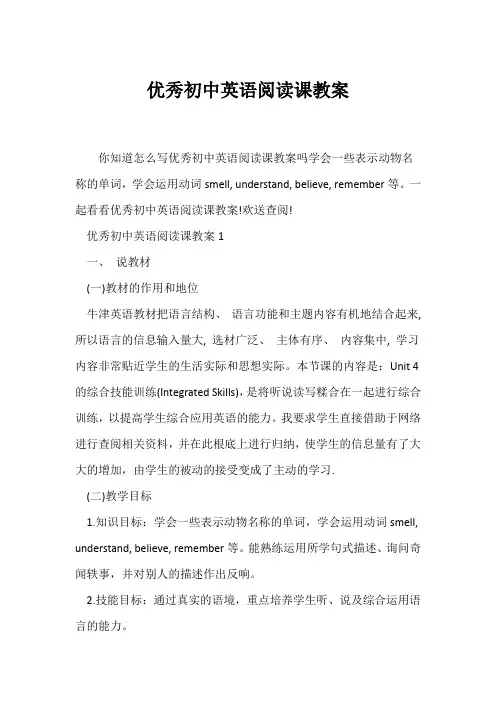
优秀初中英语阅读课教案你知道怎么写优秀初中英语阅读课教案吗学会一些表示动物名称的单词,学会运用动词smell, understand, believe, remember等。
一起看看优秀初中英语阅读课教案!欢送查阅!优秀初中英语阅读课教案1一、说教材(一)教材的作用和地位牛津英语教材把语言结构、语言功能和主题内容有机地结合起来, 所以语言的信息输入量大, 选材广泛、主体有序、内容集中, 学习内容非常贴近学生的生活实际和思想实际。
本节课的内容是:Unit 4 的综合技能训练(Integrated Skills),是将听说读写糅合在一起进行综合训练,以提高学生综合应用英语的能力。
我要求学生直接借助于网络进行查阅相关资料,并在此根底上进行归纳,使学生的信息量有了大大的增加,由学生的被动的接受变成了主动的学习.(二)教学目标1.知识目标:学会一些表示动物名称的单词,学会运用动词smell, understand, believe, remember等。
能熟练运用所学句式描述、询问奇闻轶事,并对别人的描述作出反响。
2.技能目标:通过真实的语境,重点培养学生听、说及综合运用语言的能力。
3.情感目标:培养学生的参与意识、竞争意识和合作精神,激发学生对我们所处的世界的热爱和不断探索未知世界的兴趣。
二、说教法(一)教学设计的原那么1 坚持自主学习,合作学习的教学原那么教师打破了以教师为中心, 单项灌输的陈旧模式, 在课堂教学中尽可能发挥学生的主动性和合作精神, 营造了良好的学习气氛, 更重要的是在频繁的交流中, 学生的语言表达能力提高了。
2 遵循英语教学的交际性原那么交际性原那么是英语教学中的一个指导性原那么, 教学最终的目的不仅要使学生掌握知识, 更重要的是使学生在理解的根底上, 在交际性练习中培养交际能力,而培养这种交际能力, 就是反映在课堂教学中学生以主人翁态度, 积极、主动、大胆地参与英语课堂练习活动的主体意识上。
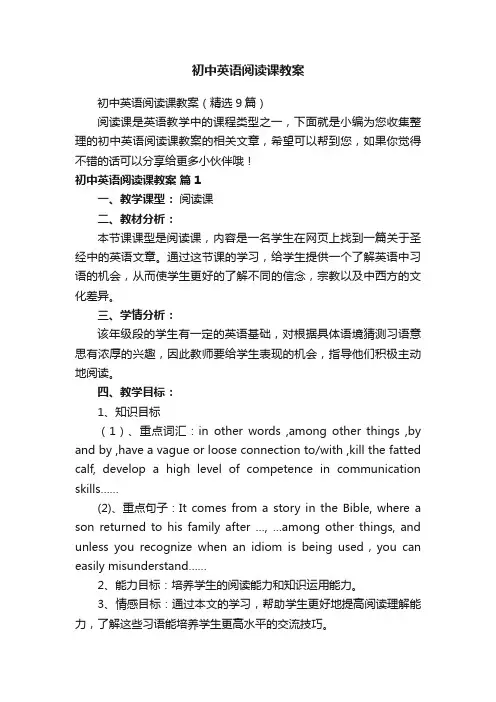
初中英语阅读课教案初中英语阅读课教案(精选9篇)阅读课是英语教学中的课程类型之一,下面就是小编为您收集整理的初中英语阅读课教案的相关文章,希望可以帮到您,如果你觉得不错的话可以分享给更多小伙伴哦!初中英语阅读课教案篇1一、教学课型:阅读课二、教材分析:本节课课型是阅读课,内容是一名学生在网页上找到一篇关于圣经中的英语文章。
通过这节课的学习,给学生提供一个了解英语中习语的机会,从而使学生更好的了解不同的信念,宗教以及中西方的文化差异。
三、学情分析:该年级段的学生有一定的英语基础,对根据具体语境猜测习语意思有浓厚的兴趣,因此教师要给学生表现的机会,指导他们积极主动地阅读。
四、教学目标:1、知识目标(1)、重点词汇:in other words ,among other things ,by and by ,have a vague or loose connection to/with ,kill the fatted calf, develop a high level of competence in communication skills……(2)、重点句子:It comes from a story in the Bible, where a son returned to his family after …, …among other things, and unless you recognize when an idiom is being used,you can easily misunderstand……2、能力目标:培养学生的阅读能力和知识运用能力。
3、情感目标:通过本文的学习,帮助学生更好地提高阅读理解能力,了解这些习语能培养学生更高水平的交流技巧。
五、教学重难点:1、培养学生的阅读能力,如略读、精读等能力。
2、提升学生综合运用语言的能力,如交际能力等。
六、教学过程:Step1: Lead inAsk the students to read the following sentence and guess what the idiom means: I took my mother’s car without asking for permission. She is angry at me. I ’m in hot water now! (in trouble )【设计说明】以有据可依的语境导入,活跃了课堂气氛又恰当的引入了本节课的主题“Biblical idioms in English ”Step2: Fast readingRead the article quickly and answer the following questions:1、What is an idiom?2、Which language was the Bible first written in?3、Which idiom is often used to describe children?【设计说明】简要的问题使学生对文章内容有大概的了解,为下一步的careful reading 奠定基础。
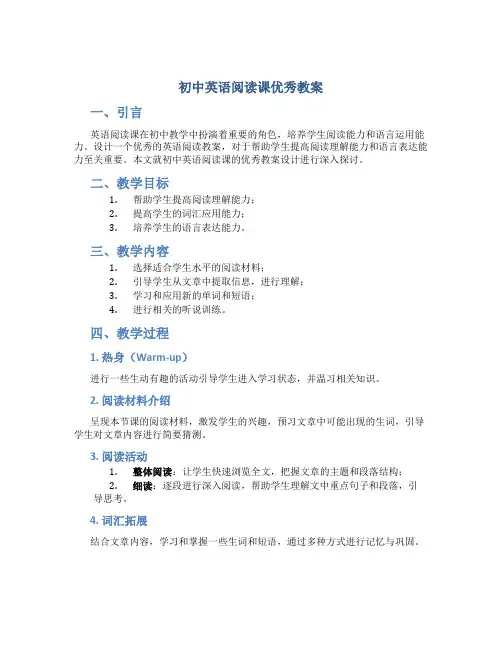
初中英语阅读课优秀教案一、引言英语阅读课在初中教学中扮演着重要的角色,培养学生阅读能力和语言运用能力。
设计一个优秀的英语阅读教案,对于帮助学生提高阅读理解能力和语言表达能力至关重要。
本文就初中英语阅读课的优秀教案设计进行深入探讨。
二、教学目标1.帮助学生提高阅读理解能力;2.提高学生的词汇应用能力;3.培养学生的语言表达能力。
三、教学内容1.选择适合学生水平的阅读材料;2.引导学生从文章中提取信息,进行理解;3.学习和应用新的单词和短语;4.进行相关的听说训练。
四、教学过程1. 热身(Warm-up)进行一些生动有趣的活动引导学生进入学习状态,并温习相关知识。
2. 阅读材料介绍呈现本节课的阅读材料,激发学生的兴趣,预习文章中可能出现的生词,引导学生对文章内容进行简要猜测。
3. 阅读活动1.整体阅读:让学生快速浏览全文,把握文章的主题和段落结构;2.细读:逐段进行深入阅读,帮助学生理解文中重点句子和段落,引导思考。
4. 词汇拓展结合文章内容,学习和掌握一些生词和短语,通过多种方式进行记忆与巩固。
5. 语言运用设计相关的练习,巩固学生的语言运用能力。
6. 听说训练通过听力训练和口语表达练习,提高学生的听力和口语表达能力。
7. 小结对所学内容进行总结回顾,并布置相关的作业。
五、教学评估教师可以通过课堂表现、作业完成情况和考试成绩等多方面来评估学生的学习效果,及时发现问题并进行调整。
六、教学反思教师应该及时对教学过程进行反思,总结经验教训,不断完善教学设计和教学方法,提升教学效果。
结语初中英语阅读课是学生提高语言能力的重要途径,通过优秀的教学设计和教案,可以更好地激发学生学习兴趣,提高学习效果。
希望本文提供的优秀教案设计能够对广大英语教师有所启发,为学生的英语学习提供更好的指导和帮助。
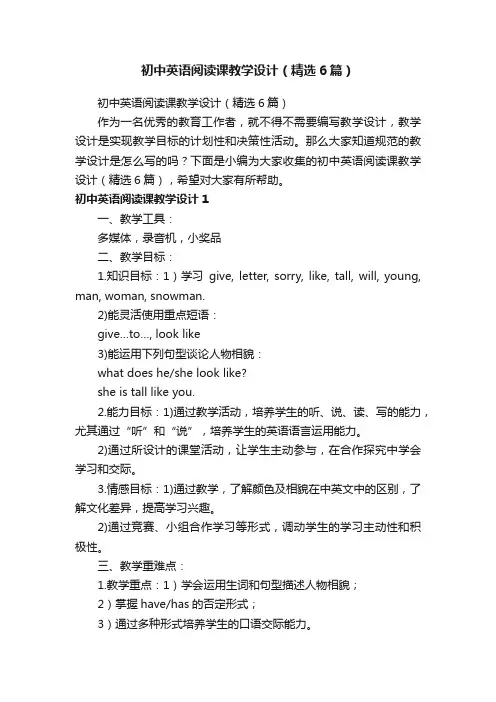
初中英语阅读课教学设计(精选6篇)初中英语阅读课教学设计(精选6篇)作为一名优秀的教育工作者,就不得不需要编写教学设计,教学设计是实现教学目标的计划性和决策性活动。
那么大家知道规范的教学设计是怎么写的吗?下面是小编为大家收集的初中英语阅读课教学设计(精选6篇),希望对大家有所帮助。
初中英语阅读课教学设计1一、教学工具:多媒体,录音机,小奖品二、教学目标:1.知识目标:1)学习give, letter, sorry, like, tall, will, young, man, woman, snowman.2)能灵活使用重点短语:give…to…, look like3)能运用下列句型谈论人物相貌:what does he/she look like?she is tall like you.2.能力目标:1)通过教学活动,培养学生的听、说、读、写的能力,尤其通过“听”和“说”,培养学生的英语语言运用能力。
2)通过所设计的课堂活动,让学生主动参与,在合作探究中学会学习和交际。
3.情感目标:1)通过教学,了解颜色及相貌在中英文中的区别,了解文化差异,提高学习兴趣。
2)通过竞赛、小组合作学习等形式,调动学生的学习主动性和积极性。
三、教学重难点:1.教学重点:1)学会运用生词和句型描述人物相貌;2)掌握have/has的否定形式;3)通过多种形式培养学生的口语交际能力。
2.教学难点:1)have/has的否定形式的教学;2)上课如何调动学生积极性。
四、教学过程step 1 warm up:enjoy a songreview the words about colors.t: we enjoyed a song just now. we have learned some words about color in section a. now please answer my questions.1) what color is it?2) how do you spell it?step 2 presentation1.lead in 3.talk about the colors of some national flags. finish 3.t: what color is the national flag?where is he/she from?what color is his/her hair?what color are his/her eyes?t: do pair works. then ask some pairs to act it out.2. lead in 2.teach “what does he/she look like?”(show another two pictures of women)(teach new words and phrases: look like, tall, man, woman, young.)t: what does the woman look like?ss: she is young. she has short blond hair and a small nose.t: what does the man look like?ss: he is old. he doesn?t have gray hair. his hair is black.(show the four pictures in part 2.)t: turn to page 35, look part 2. match the descriptions with the pictures.(ss match them)t: let?s check the answers.t: do pair works, ask and answer according to the four pictures.3. pair work: talk about the pictures, finish 2.step 3 look, listen and say1.(拿出事先准备好的一个学生的书。
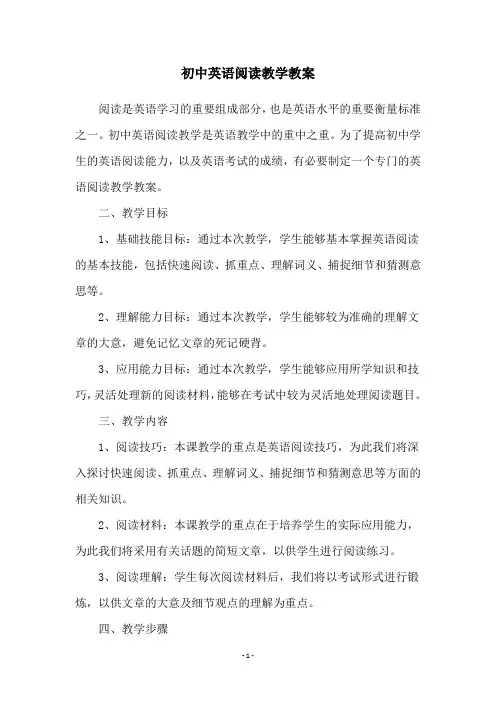
初中英语阅读教学教案阅读是英语学习的重要组成部分,也是英语水平的重要衡量标准之一。
初中英语阅读教学是英语教学中的重中之重。
为了提高初中学生的英语阅读能力,以及英语考试的成绩,有必要制定一个专门的英语阅读教学教案。
二、教学目标1、基础技能目标:通过本次教学,学生能够基本掌握英语阅读的基本技能,包括快速阅读、抓重点、理解词义、捕捉细节和猜测意思等。
2、理解能力目标:通过本次教学,学生能够较为准确的理解文章的大意,避免记忆文章的死记硬背。
3、应用能力目标:通过本次教学,学生能够应用所学知识和技巧,灵活处理新的阅读材料,能够在考试中较为灵活地处理阅读题目。
三、教学内容1、阅读技巧:本课教学的重点是英语阅读技巧,为此我们将深入探讨快速阅读、抓重点、理解词义、捕捉细节和猜测意思等方面的相关知识。
2、阅读材料:本课教学的重点在于培养学生的实际应用能力,为此我们将采用有关话题的简短文章,以供学生进行阅读练习。
3、阅读理解:学生每次阅读材料后,我们将以考试形式进行锻炼,以供文章的大意及细节观点的理解为重点。
四、教学步骤1、预习:提前准备好教材,让学生自主预习,熟悉教学内容和阅读材料;2、导入:讲授相关知识,调动学生学习的积极性,引导学生正确地阅读;3、讲授:介绍和讲解英语阅读技巧,培养学生分析和理解文章内容的能力;4、练习:提供相关练习,让学生自主完成,评估学生的阅读能力;5、结束:对本次课堂的学习情况进行总结,检查学生的作业,并给予相应的反馈和指导。
五、教学设计1、教学内容:内容上,我们将采用简短文章,以供学生进行阅读练习;2、教学方法:方法上,我们将一组组介绍英语阅读技巧,培养学生分析和理解文章内容的能力;3、教学形式:形式上,我们将让学生积极参与,让他们以小组的形式讨论,以激发学生的学习热情;4、教学效果:本次教学的主要目的是:培养学生理解和应用英语阅读技能的能力,使他们在熟悉的材料中提高阅读理解水平。
六、教学反思本次教学我采用了小组讨论的形式,让学生更加积极参与,激发了学生的学习热情,学生也很快掌握了相关知识,并且能够灵活运用。
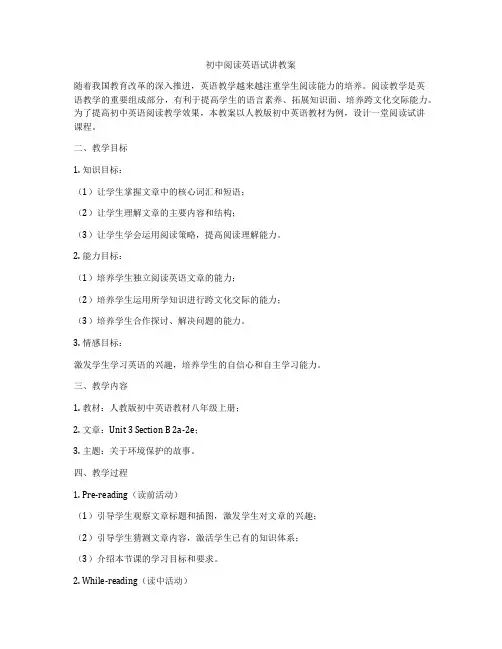
初中阅读英语试讲教案随着我国教育改革的深入推进,英语教学越来越注重学生阅读能力的培养。
阅读教学是英语教学的重要组成部分,有利于提高学生的语言素养、拓展知识面、培养跨文化交际能力。
为了提高初中英语阅读教学效果,本教案以人教版初中英语教材为例,设计一堂阅读试讲课程。
二、教学目标1. 知识目标:(1)让学生掌握文章中的核心词汇和短语;(2)让学生理解文章的主要内容和结构;(3)让学生学会运用阅读策略,提高阅读理解能力。
2. 能力目标:(1)培养学生独立阅读英语文章的能力;(2)培养学生运用所学知识进行跨文化交际的能力;(3)培养学生合作探讨、解决问题的能力。
3. 情感目标:激发学生学习英语的兴趣,培养学生的自信心和自主学习能力。
三、教学内容1. 教材:人教版初中英语教材八年级上册;2. 文章:Unit 3 Section B 2a-2e;3. 主题:关于环境保护的故事。
四、教学过程1. Pre-reading(读前活动)(1)引导学生观察文章标题和插图,激发学生对文章的兴趣;(2)引导学生猜测文章内容,激活学生已有的知识体系;(3)介绍本节课的学习目标和要求。
2. While-reading(读中活动)(1)让学生快速阅读文章,找出文章的主题句;(2)让学生细读文章,回答关于文章内容的问题;(3)让学生分析文章结构,了解文章的写作手法;(4)让学生分组讨论,分享各自的阅读心得。
3. Post-reading(读后活动)(1)让学生总结文章的主要内容,提高学生的概括能力;(2)让学生运用所学知识进行角色扮演,进行跨文化交际;(3)让学生撰写一篇关于环境保护的短文,提高学生的写作能力。
五、教学评价1. 学生阅读理解能力的提高;2. 学生跨文化交际能力的提升;3. 学生合作探讨、解决问题能力的增强;4. 学生学习英语兴趣的激发,自主学习能力的培养。
六、教学反思在课后,教师应认真反思本节课的教学效果,针对学生的实际情况进行总结,找出不足之处,为下一节课的教学做好准备。
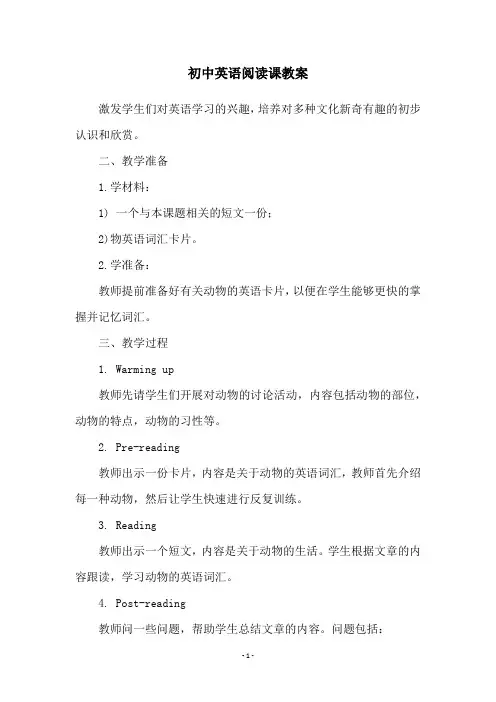
初中英语阅读课教案激发学生们对英语学习的兴趣,培养对多种文化新奇有趣的初步认识和欣赏。
二、教学准备1.学材料:1) 一个与本课题相关的短文一份;2)物英语词汇卡片。
2.学准备:教师提前准备好有关动物的英语卡片,以便在学生能够更快的掌握并记忆词汇。
三、教学过程1. Warming up教师先请学生们开展对动物的讨论活动,内容包括动物的部位,动物的特点,动物的习性等。
2. Pre-reading教师出示一份卡片,内容是关于动物的英语词汇,教师首先介绍每一种动物,然后让学生快速进行反复训练。
3. Reading教师出示一个短文,内容是关于动物的生活。
学生根据文章的内容跟读,学习动物的英语词汇。
4. Post-reading教师问一些问题,帮助学生总结文章的内容。
问题包括:What are the animals doing?They are eating, playing, sleeping……5. Homework教师要求学生根据文章内容,设计出一个游戏,练习动物英语单词。
四、设计意图该课程设计的意图在于通过让学生读一篇有关动物生活的短文,以及进行相关练习,培养学生对动物词汇的掌握,同时也能培养学生对文章内容的理解和总结能力。
中学英语课堂上,阅读课以其兴趣性、多样性和有趣性被视为教学重中之重。
而初中阶段的阅读课,更是年轻学生英语学习取得突破性进展的关键。
本文便以“初中英语阅读课教案”为题,分析了一节初中英语阅读课的教学内容与实施方案。
首先,针对该节课的教学目标,我们把语言知识目标定为:学习有关动物的英语词汇,掌握句型“What are they doing? They are…”;而情感态度价值观目标定为:激发学生们对英语学习的兴趣,培养对多种文化新奇有趣的初步认识和欣赏。
接着,按照相关的教学准备,需要准备教学材料和辅助教具,即一份与本课题相关的短文,以及与其相关的动物英语词汇卡片。
教师提前准备好它们,是为了便于学生能够更快的掌握并记忆词汇。
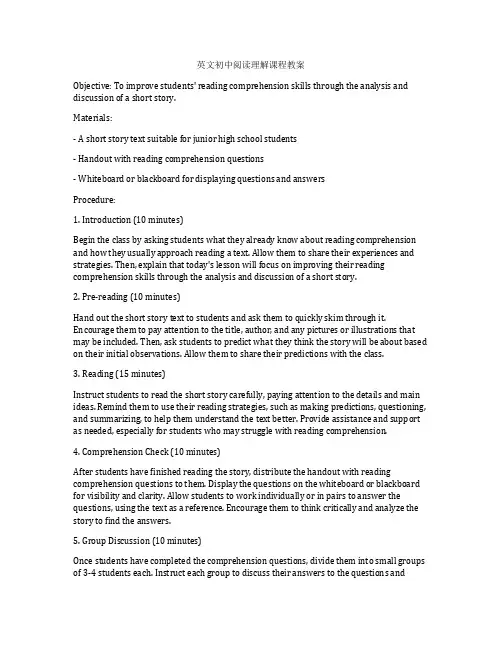
英文初中阅读理解课程教案Objective: To improve students' reading comprehension skills through the analysis and discussion of a short story.Materials:- A short story text suitable for junior high school students- Handout with reading comprehension questions- Whiteboard or blackboard for displaying questions and answersProcedure:1. Introduction (10 minutes)Begin the class by asking students what they already know about reading comprehension and how they usually approach reading a text. Allow them to share their experiences and strategies. Then, explain that today's lesson will focus on improving their reading comprehension skills through the analysis and discussion of a short story.2. Pre-reading (10 minutes)Hand out the short story text to students and ask them to quickly skim through it. Encourage them to pay attention to the title, author, and any pictures or illustrations that may be included. Then, ask students to predict what they think the story will be about based on their initial observations. Allow them to share their predictions with the class.3. Reading (15 minutes)Instruct students to read the short story carefully, paying attention to the details and main ideas. Remind them to use their reading strategies, such as making predictions, questioning, and summarizing, to help them understand the text better. Provide assistance and support as needed, especially for students who may struggle with reading comprehension.4. Comprehension Check (10 minutes)After students have finished reading the story, distribute the handout with reading comprehension questions to them. Display the questions on the whiteboard or blackboard for visibility and clarity. Allow students to work individually or in pairs to answer the questions, using the text as a reference. Encourage them to think critically and analyze the story to find the answers.5. Group Discussion (10 minutes)Once students have completed the comprehension questions, divide them into small groups of 3-4 students each. Instruct each group to discuss their answers to the questions andshare their interpretations of the story. Encourage them to ask each other questions and engage in a meaningful dialogue to deepen their understanding of the text. Provide guidance and support as needed, and circulate among the groups to monitor their discussions.6. whole-class wrap-up (10 minutes)After the group discussions, bring the class back together for a whole-class wrap-up. Ask each group to share their answers to the comprehension questions and their interpretations of the story with the class. Encourage students to ask questions and provide feedback to each other's responses. Discuss any discrepancies or differing interpretations, and use this opportunity to clarify any confusion or address any misconceptions.7. Closure (5 minutes)Conclude the lesson by summarizing the main points of the story and its themes. Reinforce the importance of reading comprehension and its role in improving students' overall reading skills. Encourage students to practice their reading comprehension skills regularly and provide them with additional reading materials or resources that they can use for practice at home or in class.Assessment:- Observations of students' reading behaviors and comprehension strategies during the lesson- Completion of comprehension questions and group discussions- Participation in class discussions and interactions。
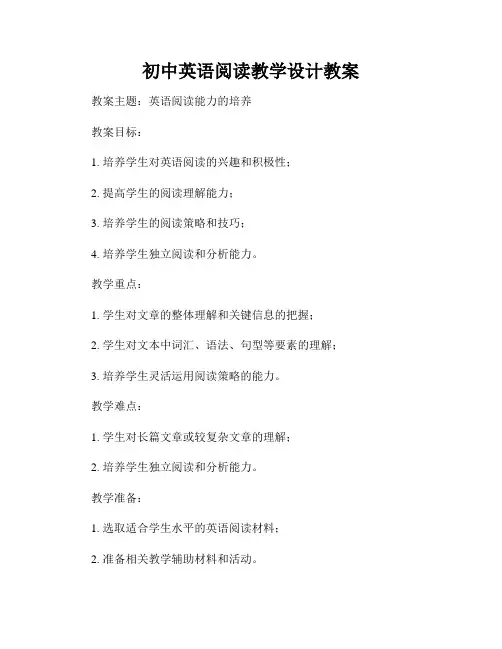
初中英语阅读教学设计教案教案主题:英语阅读能力的培养教案目标:1. 培养学生对英语阅读的兴趣和积极性;2. 提高学生的阅读理解能力;3. 培养学生的阅读策略和技巧;4. 培养学生独立阅读和分析能力。
教学重点:1. 学生对文章的整体理解和关键信息的把握;2. 学生对文本中词汇、语法、句型等要素的理解;3. 培养学生灵活运用阅读策略的能力。
教学难点:1. 学生对长篇文章或较复杂文章的理解;2. 培养学生独立阅读和分析能力。
教学准备:1. 选取适合学生水平的英语阅读材料;2. 准备相关教学辅助材料和活动。
教学过程:Step 1: 导入(5分钟)为激发学生对英语阅读的兴趣,教师可用一个趣味的小故事或问题开场。
例如:教师:大家好!你们知道为什么要学英语阅读吗?学生:因为英语太重要了!教师:确实,英语对我们来说非常重要。
但是还有其他原因吗?学生:不知道。
教师:那我们来听一个故事吧。
有一个小女孩叫丽丽,她很喜欢阅读中文故事书,可是有一天她发现,很多有趣的故事书都是用英文写的!她觉得很可惜,因为她不会看懂。
所以她决定学英语,这样她就能读懂更多有趣的故事了。
你们觉得丽丽做得对吗?Step 2: 预览和导读(10分钟)在开始阅读之前,让学生先预览文章的标题、开头和图片(如果有的话),提出一些问题,引导他们对文章的内容进行猜测和推测。
Step 3: 阅读理解(20分钟)根据学生的阅读能力,选择适当的阅读材料,让学生进行整体阅读。
然后给学生一些阅读理解题目,包括选择题、填空题或简答题,帮助他们检查自己对文章的理解程度。
Step 4: 词汇和语法学习(15分钟)在学生阅读理解的过程中,教师可以提取一些文章中的生词和语法点进行讲解和练习。
Step 5: 阅读技巧训练(15分钟)教师可以介绍一些阅读技巧,如查找关键词、注意语境暗示、快速浏览等,并结合练习活动引导学生运用这些技巧,提高阅读效率和准确度。
Step 6: 拓展阅读(15分钟)为培养学生独立阅读和分析能力,教师可以准备一些与课文相关的拓展阅读材料,让学生自主阅读并回答问题。
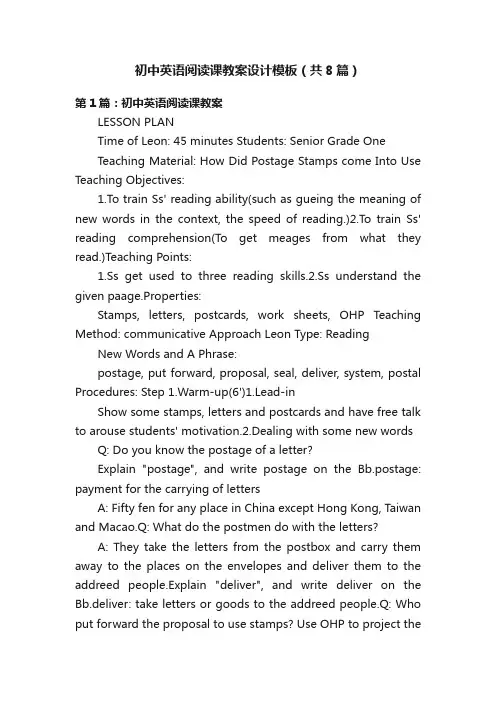
初中英语阅读课教案设计模板(共8篇)第1篇:初中英语阅读课教案LESSON PLANTime of Leon: 45 minutes Students: Senior Grade OneTeaching Material: How Did Postage Stamps come Into Use Teaching Objectives:1.To train Ss' reading ability(such as gueing the meaning of new words in the context, the speed of reading.)2.T o train Ss' reading comprehension(To get meages from what they read.)Teaching Points:1.Ss get used to three reading skills.2.Ss understand the given paage.Properties:Stamps, letters, postcards, work sheets, OHP Teaching Method: communicative Approach Leon Type: Reading New Words and A Phrase:postage, put forward, proposal, seal, deliver, system, postal Procedures: Step 1.Warm-up(6')1.Lead-inShow some stamps, letters and postcards and have free talk to arouse students' motivation.2.Dealing with some new words Q: Do you know the postage of a letter?Explain "postage", and write postage on the Bb.postage: payment for the carrying of lettersA: Fifty fen for any place in China except Hong Kong, Taiwan and Macao.Q: What do the postmen do with the letters?A: They take the letters from the postbox and carry them away to the places on the envelopes and deliver them to the addreed people.Explain "deliver", and write deliver on the Bb.deliver: take letters or goods to the addreed people.Q: Who put forward the proposal to use stamps? Use OHP to project thequestion onto the screen.Explain "put forward" and "proposal", and write them on the Bb.put forward: put an idea before people for thinking over proposal: sth.proposed, plan or idea, suggestion Again: Who put forward the proposal to use stamps? Step 2.Skimming(4'30")1.InstructionsT: Now I give you a paage to read, and for the first time you should only find the answer to the question.You have only two and a half minutes to read.So don't read word for word.Read quickly.Just try to find the answer.2.Handing out the reading material and reading 3.CheckingQ: Who put forward the proposal to use stamps.A: Rowland Hill, a schoolmaster in England.Step 3.Scanning(6')1.Instructions T: This time I give you three minutes to read the paage.When you are reading, find the answers to the two e OHP to project the questions:1.Why was the postage high in the early nineteenth century when people did not use stamps?2.When was postage stamps first put to use? 2.Reading3.Checking 1)Pair work 2)Cla checkingAns.to Que.1.Because the post offices had to send many people to collect the postage.Ans.to Que.2.On May 6, 1840.Step 4.Full reading(21')1.InstructionsT: Now I give you ten minutes to read the paage for the third time and you should read it carefully.Before reading, let's go over the questions on the work sheet.Give Work Sheet 1 to the Ss.Explain the new words in Que.4.prevent: stop, not let sb.do sth.reuse: use againT: Try to find the answers to the questions.But don't write the answers down, you can put a sign or underline the sentences concerning the questions.2.Reading 3.Checking1)Group work: Checking the answers in a group of four Ss.2)Cla work: Checking the answers in cla.Poible Answers:1.Why were people unhappy to pay postage for letters in the early nineteenth century? Because they had to pay postage when they received letters, especially when they paid for a letter which they did not wish to receive at all.The postage was high.2.Why was it much easier for people to use stamps for postage? Because people could go to the nearby post office to buy stamps and put them on envelopes before they sent the letters.3.Why was the postage much lower using stamps?Because in this way, the post office did not need to send postmen to collect postage.It only needed to send fewer postmen to deliver letters.4.How could the post office prevent people from reusing the stamps?The post office could simply put seals on the stamps so that people could not use the stamps again.Check the understanding of the word "seal", and write it on the Bb.seal: ÓÊ´Á 5.Did other countries take up the new postal system? Yes.Check the understanding of "postal" and "system", and write them on the Bb.postal: of the post system: a set of working ways6.Does every country in the world has its own stamps? Yes.Step 5: Rounding-off(7')1.Answering Ss' questions on the paage if any.2.Making a guided-dialogue with the information given from the paage.Hand out Work Sheet 2.Do it in pairs.3.Asking two or three pairs to read their dailogues.A poible completed dialogue: A: Oh, What a beautiful stamp!B: Yes, it's from the U.S.A..A: Do you know in the early nineteenth century people did not use stamps? B: Then how did they pay the postage?A: They had to pay the postage when they received letters.B:Was the postage very high then?A: Yes.Because the post offices had to send many people to collect the postage.B: Who put forward the proposal to use stamps? A: Rowland Hill, a schoolmaster in England.B: Why do post offices put seals on the stamps? A: They can prevent people from using the stamps again.B: When did post offices begin to sell stamps? A: On May 6, 1840.B: Thank you for telling me so many things about stamps.Step 6.Aignment(30")Ask the Ss to shorten the paage within four or five sentences after cla, and to write it in their exercise books.************************************************************ *Reading Material:How Did Postage Stamps come Into UseWhen you send a letter or a postcard, you have to put stamps on the envelope or on the card.When did people first begin to use stamps? Who was the first to think of this idea? In the early nineteenth century, people did not use stamps.They had to pay postage when they received letters.They were unhappy about this, especially when they paid for a letter which they did not wish to receive at all.The postage was high at that time, because the post offices had to send many people to collect the postage.Rowland Hill, a schoolmaster in England, was the first to put forward a proposal to use stamps.He thought it would be much easier for people to use stamps to cover postage.They could go to the nearby post office to buy stamps and put them on envelopes before they sent the letters.The post office could simply put seals on the stamps so that people could not use the stamps again.In this way, the post office did not need to send postmen to collect postage.It only needed to send fewerpostmen to deliver letters.That was a good idea and the government finally accepted it.On May 6, 1840, post offices throughout England began to sell stamps.Soon this new postal system was taken up by other countries.Now each country has its own stamps.And there are many people who collect stamps all over the world.Work Sheet 1:Find the answers to the following questions from the paage: 1.Why were people unhappy to pay postage for letters in the early nineteenth century?2.Why was it much easier for people to use stamps for postage?3.Why was the postage much lower using stamps?4.How could the post office prevent people from reusing the stamps?5.Did other countries take up the new postal system?6.Does every country in the world has its own stamps now? Work Sheet 2:complete the dialogue with the information you have got: A: Oh, What a beautiful stamp!B: Yes, it's from the U.S.A..A: Do you know ____________________ people did not use stamps?B: Then how did they pay the postage? A: ___________________________________________________________.B: Was the postage very high then? A: ___________________________________________________________.B: Who put forward the proposal to use stamps? A: ___________________________________________________________.B: Why do post offices put seals on the stamps? A: ___________________________________________________________.B: When did post offices begin to sell stamps? A: ___________________________________________________________.B: Thank you for telling me so many things about stamps.第2篇:初中英语阅读课教学设计一、背景现行初中英语教材具有很多的优点,但由于学生认知水平的发展具有规律性,教师只有充分认识和掌握这种规律,并结合教学实际,合理设计教学程序,充分发挥学生的主体作用,教学相长,才能达到教学效果的最优化。
初中英语阅读原创教案一、教学目标1. 知识目标(1)学生能够掌握阅读理解的基本技巧,如略读、寻读、精读等。
(2)学生能够理解文章的主旨大意,把握文章的逻辑结构。
(3)学生能够运用所学知识,正确理解并回答问题。
2. 能力目标(1)培养学生的阅读兴趣,提高阅读速度和理解能力。
(2)培养学生运用英语思维的能力,提高学生的英语素养。
3. 情感目标(1)激发学生学习英语的兴趣,增强学生的自信心。
(2)培养学生的团队协作精神,促进学生的全面发展。
二、教学内容1. 教材:人教版初中英语教材2. 教学内容:以教材中一篇阅读理解文章为例,进行教学设计。
三、教学过程1. Pre-reading(读前活动)(1)导入:教师通过与学生谈论日常话题,激发学生的阅读兴趣。
(2)预测:教师引导学生根据文章标题和插图,预测文章内容。
2. While-reading(读中活动)(1)略读:学生快速阅读文章,获取文章大意。
(2)寻读:学生根据问题,寻找文章中的关键信息。
(3)精读:学生深入理解文章细节,分析文章结构。
3. Post-reading(读后活动)(1)讨论:学生分组讨论,分享阅读心得。
(2)回答问题:学生根据文章内容,回答问题。
(3)总结:教师引导学生总结文章主旨,巩固所学知识。
四、教学评价1. 过程评价:观察学生在阅读过程中的态度、行为、合作情况等,评价学生的阅读能力。
2. 结果评价:通过回答问题、完成练习等,评价学生对文章内容的理解程度。
3. 自我评价:学生对自己在阅读过程中的表现进行评价,反思自己的学习方法。
五、教学反思教师在课后要对阅读教学进行反思,分析教学过程中的优点和不足,不断调整教学方法,提高学生的阅读理解能力。
六、教学拓展1. 推荐阅读:教师为学生推荐与文章主题相关的阅读材料,提高学生的阅读量。
2. 课外活动:组织英语角、英语剧社等活动,让学生在实践中提高英语素养。
3. 家庭作业:布置适量阅读作业,巩固课堂所学知识。
初中英语阅读教案设计全英初中英语阅读教案设计全英1一.总体目标1.加强课堂教学改革,真正转变课堂教学方式,提升学生的学习能力,争取把课堂变成学生学习的乐园。
2.做好中考总复习工作,抓好尖子生,提升临界生,盯住所有学生,不让一个学生漏掉,鼓励学生向目标迈进,中考争取稳中有升。
二.遵循原则以纲为纲,以本为本的原则,着重把握中考要求及考试范围,对《课标》和《考纲》要反复研究。
关注学生的全面发展,整体提升;重视双基,夯实基础,加强学生能力。
练习过程中重视精讲精练,精雕细刻,决不漏掉一个知识点。
同时培养学生将所学的词汇、短语、句型、句法应用到实际中,提升日常交际能力,解决实际问题。
三.具体工作措施加强学习,认真学习新课程标准,专研七.八.九年级五本教材,形成固定的知识体系,研究20XX和20XX年的考试说明,精选13和14年的中考题。
继续大练基本功,提升自身的教学能力。
实行课堂教学改革,创建新型教学模式。
走进学生家庭,走进学生的内心世界,挖掘学生的心理资源,建立新型的师生关系,既是教师,又是家长和朋友。
指导学生如何预习、听课、记笔记、复习、做作业、小结和讨论,帮助学生养成不错的学习习惯。
四.总体复习思路1.按单元复习。
通览初中教材,进行单元知识点扫描。
目的是对基础知识和基本技能进行系统的复习,把好“基础关”;任务是掌握各单元知识结构,全面地复习知识点,完成理解记忆;重点是重视课标要求与教材的基础作用,加强基础知识和基本技能的训练;面向全体,面向基础。
2.语法专项复习。
钻研考试标准和考试说明,进行语法、词法、句子、时态和话题专项复习。
统揽初中教材中的重点语法项目,使学生从整体上把握初中教材内容。
3.题型专练,模拟演练。
按照中考题型(单项选择、补全对话、句子翻译、完型填空、阅读理解和书面表达)进行题型专练,了解学生对基础知识和基本技能的掌握情况,抓住中考题型变化,确定训练方式,进行查缺补漏。
最后进行几次中考模拟演练,演练之后教师要精讲精炼,在讲题上下功夫。
初中英语阅读课教案模板全英文I. Teaching ContentThis lesson is based on Chapter 4, "The World of Geography," from the textbook "Exploring Geography." The specific content includes the introduction of different countries and regions around the world, their geographical features, and cultural highlights.II. Teaching Objectives1. Students are able to understand and describe the geographical features and cultural characteristics of different countries and regions.2. Students can use the target language to express their opinions about different cultures and traditions.III. Teaching Difficulties and Key Points1. Difficulties: Understanding and using geographical terms and expressions related to different countries and regions.Key Point: Mastering the vocabulary and sentence structures related to geography and culture.Key Point: Developing critical thinking skills through group discussions and presentations.IV. Teaching Aids and Learning Materials1. Textbook: "Exploring Geography"2. Handouts: Maps and pictures of different countries and regions3. Multimedia:PPT and video clips of cultural events and traditionsV. Teaching Process1. Prereading:a. Introduce the topic of geography and its importance in understanding the world.b. Show pictures and maps of different countries and regions, and ask students to guess their names and characteristics.2. Whilereading:a. Read the passage together, and ask students to underline the geographical terms and expressions they don't understand.b. Explain the meaning of the underlined terms and provide examples to help students understand them better.c. Ask students to read the passage again, and answer the questions given at the end of the chapter.3. Postreading:a. Divide students into groups, and assign each group a country or region to research its geographical features and cultural highlights.b. Ask each group to prepare a presentation to share their findings with the class.VI. Blackboard Design1. Title: The World of Geography2. Main Points:a. Introduction of different countries and regionsb. Geographical features and cultural highlightsVII. Homework Design1. Questionnaire:a. What are the geographical features of your country or region?b. What are the cultural highlights that make your country or region unique?c. How do you feel about the traditions and customs of your country or region?2. Research:a. Choose another country or region, and research its geographical features and cultural highlights.b. Prepare a presentation to share your findings with the class.VIII. Reflection and Extension重点和难点解析:学生需要能够表达自己的观点和进行比较。
教资中学英语阅读教学设计教学设计一:阅读理解题型训练教学目标:1. 提高学生的英语阅读能力,特别是对于阅读理解题型的应对能力;2. 培养学生正确的阅读策略和技巧,提升阅读效率;3. 培养学生对于英语阅读材料的兴趣和理解能力。
教学步骤:1. 导入(5分钟)引起学生对于英语阅读的兴趣,可以利用一段有趣的英文短文、图片或者视频作为导入。
鼓励学生积极参与讨论。
2. 预习指导(10分钟)向学生介绍阅读理解题型的常见特点、解题技巧和注意事项,为学生的后续阅读理解练习做好准备。
3. 阅读材料选择(10分钟)根据学生的英语水平和学习需求,选择适当难度的阅读材料。
可以是名人传记、新闻报道、科普知识等。
4. 练习一:快速阅读(15分钟)要求学生在规定的时间内快速阅读所提供的英语文章,以获取整体理解。
学生需要注意抓住文章的主题、段落结构和关键词等。
5. 练习二:细节理解(20分钟)根据提供的题目,学生需要仔细阅读文章,并回答与文章内容相关的细节问题。
鼓励学生从文章中寻找关键句子或者词语,帮助他们找到正确的答案。
6. 练习三:推理判断(20分钟)学生需要根据已读文章的信息进行推理判断,回答与文章意义相关的问题。
这个环节可以培养学生的逻辑思维和判断能力。
7. 练习四:解释说明(20分钟)学生需要理解文章中的生词、短语或句子,并进行解释说明。
可以让学生对于生词进行归类、造句或者进行相关语境的运用。
8. 总结与反思(10分钟)引导学生进行总结,回顾所掌握的阅读理解题型的技巧和策略。
鼓励学生思考自己在阅读过程中的不足并提出改进的方案。
教学设计二:多媒体辅助阅读教学教学目标:1. 利用多媒体手段提升学生的阅读兴趣和主动性;2. 培养学生利用多媒体资源进行英语阅读的能力;3. 提高学生的英语阅读理解能力和表达能力。
教学步骤:1. 导入(5分钟)利用多媒体手段引起学生的兴趣,例如播放与所学话题相关的视频、图片或音频等。
2. 多媒体阅读(20分钟)向学生展示一段有趣的英文文章,可以选择包含图文、音频或视频的资源。
初中英语阅读教案万能模板一、教学目标1.能够理解并掌握本课文的主要内容。
2.能够准确使用本课文中出现的生词和短语。
3.能够培养学生的阅读能力,提高理解和运用英语的能力。
二、教学重点1.理解并掌握本课文中的关键信息。
2.正确使用生词和短语。
3.训练学生的阅读技巧和能力。
三、教学准备1.教材:初中英语教科书。
2.备课材料:教案、黑板、草稿纸。
3.教学辅助工具:多媒体投影仪。
四、教学过程第一步:导入1.师生互动,引入本节课的主题。
2.激发学生兴趣,预热教学氛围。
第二步:阅读训练1.教师朗读课文,学生跟读。
2.完成课文阅读,并回答相关问题。
3.学生小组间合作,讨论理解课文中的重要内容。
第三步:词汇和短语1.引导学生掌握本课文中的生词和短语。
2.词语搭配练习,加深学生对单词和短语的印象。
第四步:阅读能力提升1.教师提出相关问题,引导学生进行探讨。
2.分角色朗读和演练课文内容。
3.提醒学生注意阅读技巧,如理解上下文,总结段落主题等。
第五步:总结反思1.学生回顾本节课学到的内容,进行个人总结。
2.教师对学生表现进行评价和点评。
3.学生提出问题,教师进行解答。
五、作业布置1.完成课后练习题目。
2.课外阅读相关文章,并进行总结及思考。
六、教学反思1.对本节课的教学过程进行反思,总结教学经验。
2.根据学生的学习情况,调整未来教学计划。
通过本节课的教学实践,相信学生们能够更好地掌握英语阅读技巧,提高阅读能力,为以后的学习打下坚实的基础。
愿大家在英语学习的道路上越走越远,取得更好的成绩!。
一专题: 记叙文one zeropassage 1One morning more than thirty years ago, I entered the Track Kitchen, a restaurant where everyone from the humblest(卑微的) to the most powerful came for breakfast. I noticed an empty chair next to an elderly, unshaven man, who looked somewhat disheveled. He was wearing a worn-out hat and was alone. I asked if I might join him. He agreed quietly and I sat down to have my breakfast.We cautiously began a conversation and spoke about a wide rang of things. We never introduced ourselves. I was concerned that he might have no money and not be able to afford something to eat. So as I rose to go back to the counter and buy a second cup of coffee, I asked, ―My I get you something?‖―A coffee would be nice.‖Then I bought him a cup of coffee, we talked more, and he accepted another cup of coffee, Finally, I rose to leave, wished him well, and headed for the exit. At the door I met one of my friends. He asked,―How did you get to know Mr. Galbreath?‖―Who?‖―The man you were sitting with. He is chairman of the Board of Churchill Downs. ‖I could hardly believe it. I was buying, offering a free breakfast, and feeling pity for one of the world‘s richest and most powerful men!My few minutes with Mr. Galbreath changed my life. Now I try to treat everyone with respect, no matter who I think they are, and no matter another human being with kindness and sincerity.56. What does the underlined word ―disheveled‖ mean?A. Unfriendly.B. Untidy.C. Gentle.D. Kind.57. The author bought coffee for the old man becauseA. he thought the old man was poorB. he wanted to start a conversationC. he intended to show his politenessD. he would like to thank the old man58. How did the author probably feel after he talked with his friend?A. Proud.B. Pitiful.C. Surprised.D. Regretful59. What is the message mainly expressed in the story?A. We should learn to be generous.B. It is honorable to help those in need.C. People in high positions are not like what we expect.D. We should avoid judging people by their appearances.Andy rode slowly on his way to school, day-dreaming about the fishing trip that his father had promised him. He was so busy dreaming about all the fish he would catch that he was unaware of everything else around him.He rode along until a strange sound drew him to the present. He came to a stop and looked curiously up to the heavens. What he saw shocked and terrified him. A huge swarm of bees filled the sky like a black cloud and the buzzing mass seemed to be heading angrily towards him.With no time to waste, Andy sped off in the opposite direction, riding furiously—but withoutknowing how to escape the swarm. With a rapidly beating heart and his legs pumping furiously, he sped down the rough road. As the bees came closer, his panic increased. Andy knew that he was sensitive to bee stings. The last sting had landed him in hospital—and that was only one bee sting! He had been forced to stay in bed for two whole days. Suddenly, his fat her‘s words came to him. ―When you are in a tight situation, don‘t panic. Use your brain and think your way out of it. ‖On a nearby hill, he could see smoke waving slowly skywards from the chimney of the Nelson family home. ―Bees don‘t like smoke,‖ he thought. ―They couldn‘t get into the house.‖Andy raced towards the Nelson house, but the bees were gaining ground. Andy knew he could not reach the house in time. He estimated that the bees would catch up with him soon.Suddenly, out of the corner of his eyes, he spotted a small dam used by Mr. Nelson to irrigate his vegetable garden. Off his bike and into the cool water he lived, disappearing below the surface and away from the savage insects. After holding his breath for as long as he could, Andy came up for air and noticed the bees had gone. Dragging himself out of the dam, he struggled up the hilly slope and rang the doorbell. Mrs. Nelson took him inside and rang his mother.―Y ou‘ll really need that fishing break to help you recover,‖ laughed his mother wi th relief. ―Thank goodness you didn‘t panic!‖ But Andy did not hear her. He was dreaming once again of the fish he would catch tomorrow.56. Why did Andy fail to notice the swarm of bees earlier?A. He was riding to school.B. He was listening to a strange sound.C. He was going fishing with his father.D. He was lost in the thought of the fishing trip.57. Which of the following is NOT mentioned about the swarm of bees in the passage?A. They crowded like a black cloud.B. They shocked and terrified Andy.C. They tried to attack Andy in a mass.D. They made Andy stay in hospital for two days.58. How did Andy avoid the bees in the end?A. He asked Mr. Nelson in help.B. He hid himself under the water.C. He rushed into the Nelson house.D. He rode off in the opposite direction.59. Which of he f ollowing can best describe Andy‘s escape from the be es?A. No pain no gains.B. Once bitten, twice sheC. Where there is a will, there is a way.D. In time of danger, one‘s mind works fast.Passage 3Ask Dr. Jeffers This month Dr. Jeffers is answering questions about the human brain and how it works.Dear Dr. Jeffers,One of my colleagues, Felix Moeller, told me that scientists are learning to use computer to ‗read minds‘. Is there any truth to this story/—Jane Leon, New Y ork, USADear Ms. Leon,Well, a lot of research is being conducted in this area, but so far, the brain scanning equipment and corresponding computer programs haven‘t been able to actually read thoughts. In one experiment, test subjects(受试者)were connected to scanning equipment and shown two numbers on a screen. They were then asked to choose between adding or subtracting(减)the two numbers. Using this method, researchers were able to follow brain processes and make the correct assumptions(假设)70 perce nt of the time. It‘s not quite mind reading, but it‘s certainly a first step.—Dr. J.Dear Dr. Jeffers,My three-year-old son loves it when I dig my fingers into his sides and tickle (胳肢)him until he laughs uncontrollably. The other day I noticed him tryin g to tickle himself but he couldn‘t do it. Why not?—Glenn Lewis, V ancouver, CanadaDear Mr. Lewis,It‘s because of how the brain works. The brain is trained to know what to pay attention to and what to ignore. It causes us to ignore physical feelings we expect to happen, but it causes a mild panic reaction when there is an unexpected feeling. For example, you don‘t notice how your shoulder feels while you‘re walking down the street. But if someone comes up behind you and touches you lightly on the shoulder, you may jump in fear. It‘s that unexpected part that causes the tickle reaction.—Dr. J.46. What can we learn from the answer to the first question?A. Some equipment is able to read human minds.B. Some progress has been made in mind reading.C. Test subjects have been used to make decisions.D. Computer programs can copy brain processes.47. People laugh when tickled by others because the feeling is _______.A. unexpectedB.expectedC. comfortableD. uncomfortable48.Who has got a little child according to the text?A. Ms. LeonB. Mr. LewisC. Mr. MoellerD. Dr. Jeffers49.According to the text, Jeffers is probably _______.A. a computer programmerB. a test subjectC. a human brain expertD. a medical doctorPassage 4Brave Frenchman Found Half-way Around the World(NEW YORK) A French tourist highly praised for rescuing a two-year-old girl in Manhattan said he didn‘t think twice before diving into the freezing East River.Tuesday‘s Daily News said 29-year who left the spot quickly after the rescue last Saturday.He lifted the little girl out of the water after she fell off the bank at the South Street Scaport museum. He handed the girl to her father, David Anderson, who had dive in after him.“I didn‘t think at all,‖ Duret told the Daily News. ―It happen ed very fast. I reacted very fast.‖Duret, an engineer on vacation ,was walking with his girlfriend along the pier(码头)when he saw something falling into the water .He thought it was a doll, but realized it was a child when he approached the river. In an instant, he took off his coat and jumped into the water.When he reached the girl, she appeared lifeless, he said. Fortunately, when she was out of the water, she opened her eyes.Anderson said his daughter slipped off the bank when he was adjusting his camera. An ambulance came later for her, said Duret, who was handed dry clothes from cookers. Duret caught a train with his girlfriend shortly after.The rescue happened on the day before he left for France. Duret said he didn‘t realize his tale of heroism he was leaving the next morning.“I don‘t really think I‘m a hero,‖ said Duret. ―Anyone would do the same t h ing.‖50. Why was Duret in New Y ork?A. To meet his girlfriendB. To work as an engineerC. To spend his holidayD. To visit the Andersons.51. What did Duret do shortly after the ambulance came?A. He was interviewed by a newspaperB. He asked his girlfriend for his dry clothesC. He went to the hospital in the ambulanceD. He disappeared from the spot quickly52. Who divide after Duret into the river to save the little girl?A. David AndersonB. a passer-byC. his girlfriendD. a taxi driver.53. When was duet most probably found to be the very hero?A. the day when he was leaving for home.B. a couple of days after the girl was rescuedC. the first day when he was in New Y orkD. the same day when he was interviewed.Passage 5When I was six,Dad brought home a dog one day,who was called “Brownie”. My brothers and I all loved Brownie and did different things with her. One of us would walk her,another would feed her,then there were baths,playing catch and many other games. Brownie,in return,loved each and every one of us. One thing that most touched my heart was that she would go to whoever was sick and just be with them. We always felt better when she was around.One day,as I was getting her food,she chewed up(咬破) one of Dad's shoes,which had to be thrown away in the end. I knew Dad would be mad and I had to let her know what she did was wrong. When I looked at her and said,“Bad girl,”she looked down at the ground and then went and hid. I saw a tear in her eyes.Brownie turned out to be more than just our family pet. She went everywhere with us. People would stop and ask if they could pet her. Of course she'd let anyone pet her. She was just the most lovable dog. There were many times when we'd be out walking and a small child would come over and pull on her hair. She never barked(吠) or tried to get away. Funny thing is she would smile. This frightened people because they thought she was showing her teeth. Far from the truth,she loved everyone.Now many years have passed since Brownie died of old age. I still miss the days when she was with us.41.What would Brownie do when someone was ill in the family?A. Look at them sadly.B. Keep them company.C. Play games with them.D. Touch them gently.42.We can infer from Paragraph 2 that Brownie _______..A. would eat anything when hungryB. felt sorry for her mistakeC. loved playing hide-and-seekD. disliked the author's dad43.Why does the author say that Brownie was more than just a family pet?A. She was treated as a member of the family.B. She played games with anyone she liked.C. She was loved by everybody she met.D. She went everywhere with the family.44.Some people got frightened by Brownie when she _______..A. smiledB. barkedC. rushed to themD. tried to be funny45.Which of the following best describes Brownie?A. Shy.B. Polite.C. Brave.D. Caring.Passage 6Goldie's SecretShe turned up at the doorstep of my house in Cornwall. No way could I have sent her away. No way, not me anyway. Maybe someone had kicked her out of their car the night before. "We're moving house. '; "No space for her any more with the baby coming. " "We never really wanted her, but what could we have done? She was a present. ―People find all sorts of excuses for abandoning an animal. And she was one of the most beautiful dogs I had ever seen.I called her Goldie. If I had known what was going to happen I would have givenher a more creative name. She was so unsettled during those first few days. She hardly ate anything and had such an air of sadness about her. There was nothing I could do to make her happy, it seemed. Heaven knows what had happened to her at her previous owner's. But eventually at the end of the first week she calmed down. Always by my side, whether we were out on one of our long walks or sitting by the fire.That's why it was such a shock when she pulled away from me one day when we were out for a walk. We were a long way from home, when she started barking and getting very restless. Eventually I couldn't hold her any longer and she raced off down the road towards a farmhouse in the distance as fast as she could.By the time I reached the farm I was very tired and upset with Goldie. But when I saw her licking (舔) the four puppies (幼犬) I started to feel sympathy towards them. "We didn't know what had happened to her," said the woman at the door. "I took her for a walk one day, soon after the puppies were born, and she just disappeared.‖ "She must have tried to come back to them and got lost," added a boy from behind her. 'I must admit I do miss Goldie, but I've got Nugget now, and she looks just like her mother. And I've learnt a good lesson: not to judge people. 56. How did the author feel about Goldie whenGoldie came to the house?A. Shocked.B. Sympathetic.C. Annoyed.D. Upset.57. In her first few days at the author's house, Goldie _______.AI felt worried B. was angryC. ate a littleD. sat by the fire58. Goldie rushed off to a farmhouse one day because she _______ .A. saw her puppiesB. heard familiar barkingC. wanted to leave the authorD. found her way to her old home59. The passage is organized in order of _______A. timeB. effectivenessC. importanceD. complexityPassage 7It was a Sunday and the heavy storm had lasted all night. The morning after the storm, though, was beautiful: blue skies, warm air and a calm, inviting sea touching the shore gently.My father realized it was a good day for fishing and invited my sister and me to go with him.I was only 14 and fishing had never been my thing, but I decided to go all the same. I' m so glad I did.On the road to the harbour we could see the terrible destruction on the coast, but the harbour itself was in fairly good shape. After all, it was protected by the arms of a bay that had only one tiny channel to the sea. As we got on board, we noticed two big humps (脊背) in the distance.On approaching them, we saw it was a mother whale with her baby. We couldn't believe it —there aren't any whales along the coast here. The storm must have driven them across the ocean into the bay, in which the still water was so badly polluted that nothing could survive.The little baby whale —actually as big as our boat—was obviously stuck and could not move. The mother dived under the water and came up suddenly, making big whirlpools (漩涡) and waves. "She‘s trying to help her baby, but on the wrong side, " my father said. At this point, my father moved our boat in a semicircle to the other side and, heading the boat towards the baby whale, pushed it gently. With our several gentle pushes the big hump turned over and disappeared under water. Then it swam up right beside its mum. They struggled in their desperate attempts to escape but missed the exit and started heading in the wrong direction. We hurried up to the whales and tried to lead them towards the bay channel. Slowly, they let us lead them, sometimes rising from the water right beside us to breathe — and to give us a trusting look with those huge eyes. Once they hit their first part of clean water flowing straight from the sea, the mum gave us a wave with her tail and off they swam into the distance.In the excitement it had felt like only a few minutes, but we had been with those wonderful animals for almost an hour and a half. That was the simple and lasting beauty of the day. Nearly four decades later, I still look back fondly to that golden day at sea.51. The author says "I'm so glad I did." (In Para. 2) because ________.A. he witnessed the whole process of fishingB. he enjoyed the beauty of the calm seaC. he experienced the rescue of the whalesD. he spent the weekend with his family52.The harbour survived the storm owing to ________.A. the shape of the harbourB. the arms of the bayC. the still water in the channelD. the long coast line53.The mother whale failed to help her baby because ________.A. she had stayed in the polluted water for too longB. the whirlpools she had made were not big enoughC. she had no other whales around to turn to for helpD. the waves pushed her baby in the wrong direction54.What is the theme of the story?A. Saving lives brings people a sense of happiness.B. Fishing provides excitement for children.C. It's necessary to live in harmony with animals.D. It's vital to protect the environment.Passage 8Christopher Thomas, 27, was a writer by night and a teacher by day when he noticed he was always tired and was losing weight fast. Diagnosed with diabetes(糖尿病), Thomas would need to inject himself with insulin(胰岛素) three times a day for the rest of his life or risk nerve damage, blindness, and even death. And if that weren't bad enough, he had no health insurance.After a month of feeling upset, Thomas decided he'd better find a way to fight back. He left Canton, Michigan for New Y ork, got a job waiting tables, nicknamed himself the Diabetic Rockstar, and created , a free online community for diabetics and their loved ones—a place where over 1,100 people share personal stories, information, and resources.Jason Swencki's son, Kody, was diagnosed with type diabetes at six. Father and son visit the online children's forums(论坛) together most evenings. "Kody gets so excited, writing to kids from all over," says Swencki, one of the site's volunteers. "They know what he's going through, so he doesn't feel alone."Kody is anything but alone: Diabetes is now the seventh leading cause of death in the United States, with 24 million diagnosed cases. And more people are being diagnosed at younger ages.These days, Thomas's main focus is his charity (慈善机构), Fight It, which provides medicines and supplies to people—225 to date—who can't afford a diabetic's huge expenses. has raised about $23,000—in products and in cash. In May, Thomas will hold the first annual Diabetic Rockstar Festival in the Caribbean.Even with a staff of 22 volunteers, Thomas often devotes up to 50 hours a week to his cause, while still doing his full-time job waiting tables. "Of the diabetes charities out there, most are putting money into finding a cure,‖ says Bentley Gubar, one of Rockstar's original members. "But Christopher is the only person I know saying people need help now."56. Which of the following is true of Christopher Thomas?A. He needs to go to the doctor every day.B. He studies the leading cause of diabetesC. He has a positive attitude to this disease.D. He encourages diabetics by writing articles.57. was created for ________.A. diabetics to communicateB. volunteers to find jobsC. children to amuse themselvesD. rock stars to share resources.58. according to the text, Kody ________.A. feel lonely because of his illnessB. benefits from C. helps create the online kid's forumsD. writes children's stories online59. What can we learn about Fight It?A. It helps the diabetics in financial difficulties.B. It organizes parties for volunteer once a year.C. It offers less expensive medicine to diabetics.D. It owns a well-known medical website.60. The last paragraph suggests that Thomas ________.A. works full-time in a diabetes charityB. employs 22 people for his websiteC. helps diabetics in his own wayD. ties to find a cure for diabetesPassage 9When you are little, the whole world feels like a big playground. I was living in Conyers, Georgia the summer it all happened. I was a second grader, but my best friend Stephanie was only in the first grade. Both of our parents were at work and most of the time they let us go our own way.It was a hot afternoon and we decided to have an adventure in Stephanie's basement. As I opened the basement door, before us lay the biggest room, full of amazing things like guns, dolls, and old clothes. I ran downstairs, and spotted red steel can. It was paint. I looked beyond it and there lay even more paint in bright colors like purple, orange, blue and green."Stephanie, I just found us a project for the day. Get some paintbrushes. We are fixing to paint. "She screamed with excitement as I told her of my secret plans and immediately we got to work. We gathered all the brushes we could find and moved all of our materials to my yard. There on the road in front of my house, we painted bit stripes (条纹) of colors across the pavement (人行道). Stripe by stripe, our colors turned into a beautiful rainbow. It was fantastic!The sun was starting to sink. I saw a car in the distance and jumped up as I recognized the car. It was my mother. I couldn't wait to show her my masterpiece. The car pulled slowly into the driveway and from the look on my mother's face, I could tell that I was in deep trouble.My mother shut the car door and walked towards me. Her eyes glaring, she shouted, "What in the world were you thinking? I understood when you made castles out of leaves, and climbed the neighbors' trees, but this! Come inside right now!" I stood there glaring hack at her for a minute, angry because she had insulted (侮辱) my art."Now go clean it up!" Mother and I began cleaning the road. Tears ran down my cheeks as I saw my beautiful rainbow turn into black cement.Though years have now passed, I still wonder where my rainbow has gone. I wonder if, maybe when I get older, I can find my rainbow and never have to brush it away. I guess we all need sort of rainbow to brighten our lives from time to time and to keep our hopes and dreams colorful.41. What did the writer want to do when his mother came home?A. To introduce Stephanie to her.B. To prevent her from seeing his painting.C. To put the materials back in the yard.D. To show his artwork to her.42. In his mother's eyes, the writer________.A. was a born artistB. always caused troubleC. was a problem solverD. worked very hard43.The underlined word "rainbow" in the last paragraph refers to ________.A. the rainbow in the skyB. the stripes on the pavementC. something imaginative and funD. important lessons learned in childhood44.It can be learned from the passage that parents should ________.A. encourage children to paintB. value friendship among childrenC. discover the hidden talent in childrenD. protect rather than destroy children's dreamsPassage 10It was a village in India. The people were poor. however, they were not unhappy. After all, their forefathers had lived in the same way for centuries.Then one day. Some visitors from the city arrived. The told the villagers there were some people elsewhere who liked to eat frog's legs. however, they did not have enough frogs of their own, and so they wanted to buy frogs from other place.This seemed like money for nothing. There were millions of frogs in the fields around, and they were no use to the villagers. All they had to do was catch them. Agreement was reached, and the children were sent into the fields to catch frogs. Every week a truck arrived to collect the catch and hand over the money. For the first time, the people were able to dream of a batter future, but the dream didn't last long.The change was hardly noticed at first, but it seemed as if the crops were not doing so well. More worrying was that the children fell ill more often, and, there seemed to be more insects around lately.The villagers decided that they couldn't just wait to see the crops failing and the children getting weak. They would have to use the money earned to buy pesticides(杀虫剂) and medicines. Soon there was no money left.Then the people realized what was happening. It was the frog. They hadn't been useless. They had been doing an important job—eating insects. Now with so many frogs killed, the insects were increasing more rapidly. They were damaging the crops and spreading diseases.Now, the people are still poor. But in the evenings they sit in the village square and listen to sounds of insects and frogs. These sounds of the night now have a much deeper meaning.56. From paragraph I we learn that the villagers ________.A. worked very hard for centuriesB. dreamed of having a better lifeC. were poor but somewhat contentD. lived a different life from their forefathers57. Why did the villagers agree to sell frogs?A. The frogs were easy money.B. They needs money to buy medicine.C. They wanted to please the visitors.D. The frogs made too much noise.58. What might be the cause if the children's sickness?A. the crops didn't do wellB. there were too many insectsC. the visits brought in diseasesD. the pesticides were overused59. What can we infer from the last sentence of the text?A. Happiness comes from peaceful life in the country.B. Health is more important than money.C. The harmony between man and nature is important.D. Good old day will never be forgotten.一专题: 记叙文zero ninePassage 1How I Turned to Be OptimisticI began to grow up that winter night when my parents and I were returning from my aunt‘s house, and my mother said that we might soon be leaving for America. We were on the bus then. I was crying, and some people on the bus were turning around to look at me. I remember that I could not bear the thought of never hearing again the radio program for school children to which I listened every morning.I do not remember myself crying for this reason again. In fact, I think I cried very little when I was saying goodbye to my friends and relatives. When we were leaving I thought about all the places I was going to see—the strange and magical places I had known only from books and pictures. The country I was leaving never to come back was hardly in my head then.The four years that followed taught me the importance of optimism, but the idea did not come to me at once. For the first two years in New Y ork I was really lost—having to study in three schools as a result of family moves. I did not quite know what I was or what I should be. Mother remarried, and things became even more complex for me. Some time passed before my stepfather and I got used to each other. I was often sad, and saw no end to ―the hard times.‖ My responsibilities in the family increased a lot since I knew English better than everyone else at home. I wrote letters, filled out forms, translated at interviews with Immigration officers, took my grandparents to the doctor and translated there, and even discussed telephone bills with company representatives.()From my experiences I have learned one important rule: almost all common troubles eventually go away! Something good is certain to happen in the end when you do not give up, and just wait a little! I believe that my life will turn out all right, even though it will not be that easy.56. How did the author get to know America?A. From her relatives.B. From her mother.C. From books and pictures.D. From radio programs.。